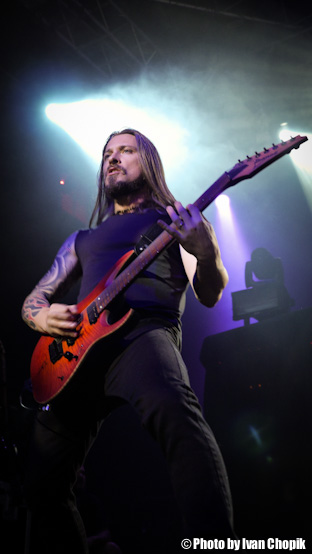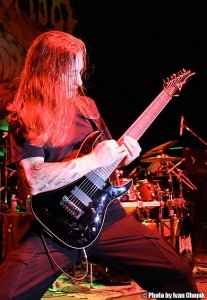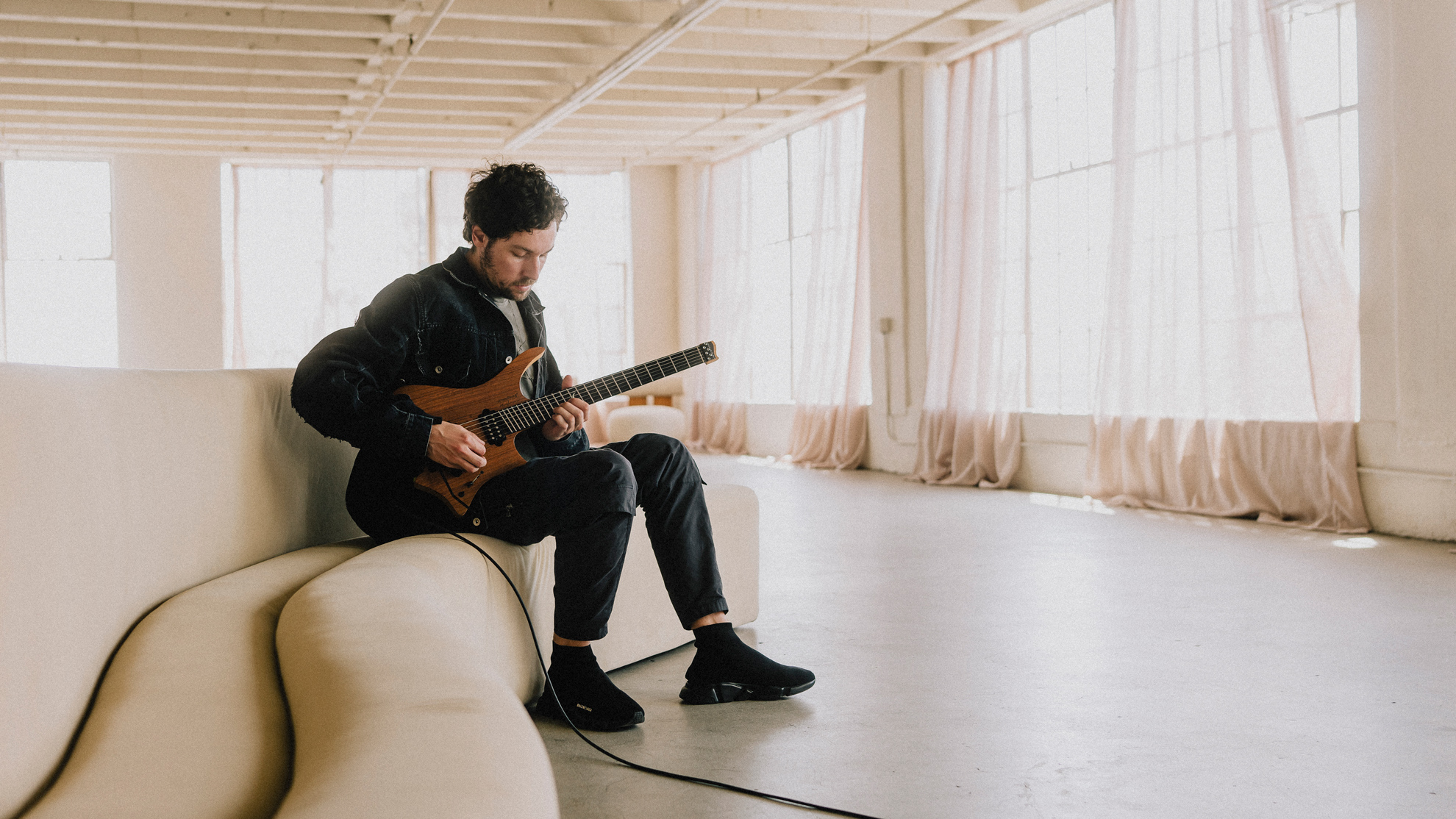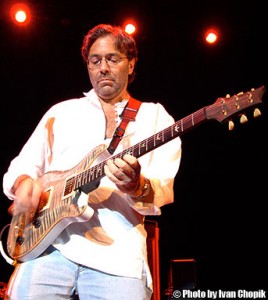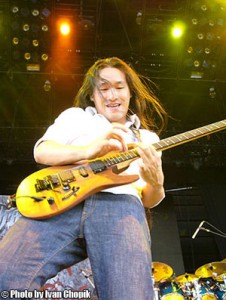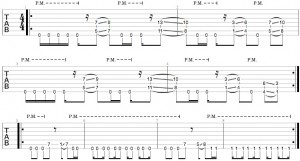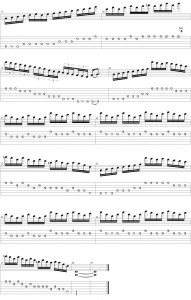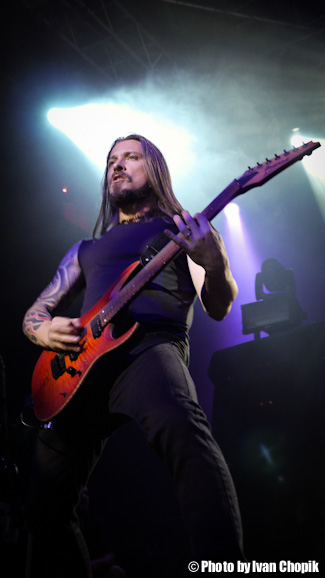 Known for his explosive, harmonically-laden guitar fireworks, solo artist and All Shall Perish axe-slinger Francesco Artusato has fired off a new chapter with his supergroup, Devil You Know. The new band found its beginnings amidst writing sessions between Francesco and Australian drummer John Sankey, who is best known for his work with Devolved, as well as Divine Heresy and Fear Factory. Shifting focus from their extreme metal forte, the duo entered into a prolific songwriting period, carefully choosing between moments of elegant progressions, and fiery, calculated aggression.
Known for his explosive, harmonically-laden guitar fireworks, solo artist and All Shall Perish axe-slinger Francesco Artusato has fired off a new chapter with his supergroup, Devil You Know. The new band found its beginnings amidst writing sessions between Francesco and Australian drummer John Sankey, who is best known for his work with Devolved, as well as Divine Heresy and Fear Factory. Shifting focus from their extreme metal forte, the duo entered into a prolific songwriting period, carefully choosing between moments of elegant progressions, and fiery, calculated aggression.
Powerhouse vocalist Howard Jones joined Artusato and Sankey in late 2012. Renowned for his decade with metalcore pioneers Killswitch Engage, Jones rounded out the unified sound that became Devil You Know with his signature scorching screams and soulful melodic vocals. Completed by bassist Ryan Wombacher and guitarist Roy-Lev Ari, the band unveiled the US release of their debut album, The Beauty of Destruction, on April 29th. The following day, Francesco spoke with us during a tour stop in Orlando, FL:
IC: You’re often asked about how the reception [has been for the new album]. How has it been different from what you expected it might be with regards to this new album and band?
FA: I’m surprised to see so much excitement; the fact that it’s a brand new band and we’ve already been on the road for two weeks, and the album was not even out. People loved it! It was a great reaction and [we’ve had] great shows. I’m so excited! It feels so fresh; brand new music and the first time playing it live in front of people, it’s just awesome.
IC: The musical chemistry is clear, listening to you guys on the record. What’s it like for you guys personally? I know, for example, you and Howard [Jones, vocals] had only met for the first time when you were talking about being in a band together.
FA: Yes, totally. It was a weird time, because Howard was not even thinking about doing anything with music anymore. When we started talking, it was supposed to maybe be a studio project just for fun. Then, as soon as we started to get it rolling and got managers involved, the label, agents… it’s like ‘Alright, want to tour?’ ‘Yes, sure!’
Now, all of a sudden, he’s doing it, he’s in another band doing this all over again. He’s enjoying it. It’s the same thing for all of us. We’ve been on this tour, like I said, for two weeks and it feels like we just left. It’s fun. We all get along and we have very good chemistry. That’s why even when you’ve got those moments when you’re a little tired, you don’t really care about it, and you just can’t wait to be on the stage again every day.
IC: I know that you and John [Sankey, drums] had been writing music for years, actually, before this band even materialized. When you guys set out to write you didn’t necessarily have a specific sound in mind. I understand start it was just to start writing together?
FA: Yes.
| Click play above to watch part 1 of the video for this interview. |
IC: Now that Howard is in the band, you guys have worked together and put together this album. How does the original vision of what you were sounding like in the beginning differ to where you’ve come to now?
FA: We actually have a song on the record called ‘Shut It Down’ and that’s either song one or two of almost forty songs that we wrote, and that stayed the same. We were not thinking about anything back then. We were just like, ‘Let’s write a song!’
But obviously, after we got Howard involved, we started writing really thinking about the possibility of having a singer like him. All three of us gave each other a lot of freedom to experiment and do things that we always felt like we’d never done before. This was the time to do it. John and I kept going and wrote bunch of material. Howard liked everything we were writing. In fact, it was really weird when we got to the studio. We had so much material…
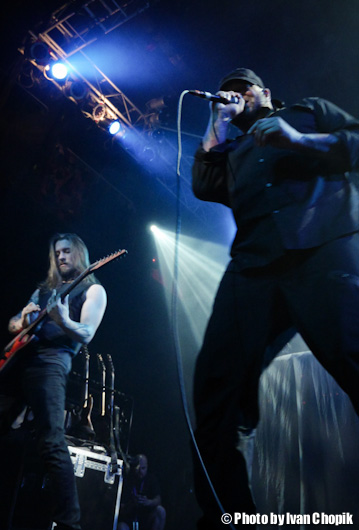
Francesco Artusato & Howard Jones
IC: Forty songs is a lot!
FA: Yeah, it was like, ‘What should we put on the record?’ We didn’t even know. We pretty much liked everything; everyone liked everything they were doing. It was a very cool process, kind of different from the past and from anything I’ve done before.
IC: How did you end up narrowing down the material? There are twelve songs on the album, but you wrote forty going into it.
FA: I don’t know; whatever was making more sense. We had people involved: the label and even managers, and the producer [Logan Mader]. We started showing a lot of material to the producer in the studio. And even for Howard some of the material was new, and he was literally saying, ‘Guys please stop writing music! I can’t… !’ [laughs]
IC: Once the label got involved and you guys were looking to make a record, was there a push from the label towards a specific direction?
FA: Not really. The awesome thing about working with Monte Conner – he’s about the music. He loved the demos that we had showed him and he’s was like, ‘You guys are the musicians. You guys are the writers.’
That was awesome. You never know… I was expecting maybe a bunch of people to come and tell us, ‘It needs to sound like this. It needs to sound like that. Don’t make it to sound too much like that.’ And instead it was like, ‘You guys do whatever you want.’ I loved it. It’s always my favorite part – just writing music, from writing a riff to getting the full song finished. It’s the coolest part about this job.
IC: You covered a lot of ground on the record – there’s fast material, slow material, heavy and melodic… you have a whole variety of metal happening here. Was there anything that came out of it that you didn’t expect to, as you were writing it?
FA: The cool thing is that all three of us wanted to make a record that had a lot of variation. We were like, ‘You know what? I don’t care if somebody is going to think this song is very different from the other song.’ I like records that have songs that are very different from each other. I don’t want to hear the same song over and over, or the same tunings… having the same first note of the song start in the same key.
I want a lot of variation, even sonically. I want to have a song that has completely different dynamics. I like to have the really fast and crazy song, and then maybe a ballad with just clean guitars or something like that. The last song on the record was something that kind of happened by accident. It’s a very dark, slow song. I just started writing it for fun… thinking maybe they’re going to think it’s crazy, that it wouldn’t even fit. None of us had ever done anything similar to that. As soon as I showed it to Howard, he e-mailed me right away, saying ‘Man, I always wanted to do a song like this! It needs to be on the record.’
There are twelve songs on the record, but we actually tracked and finished a lot more songs in the studio. Even now, there’s so much cool stuff that I almost wish we had more songs on the record. For a moment, John and I were thinking, ‘Maybe we should do a double album.’ But it’s too soon for that – maybe for the next record. It’s so easy to write with him and Howard.
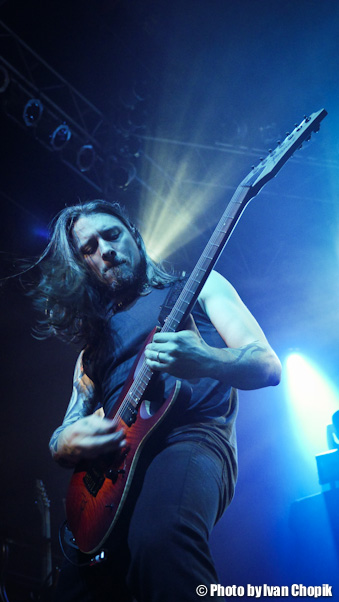 IC: And I’m wondering about that process… How do you get to that amount of material? What’s the workflow like as you go back and forth?
IC: And I’m wondering about that process… How do you get to that amount of material? What’s the workflow like as you go back and forth?
FA: It started with John and myself. Most of the time, he would write drum beats and send songs that would have… a five-minute song, just drums, and then all different kind of different grooves and different things. My job would be to listen to it, and I’d feel like, ‘Okay – this could be the chorus. This could be the verse.’ And I would start putting riffs over it and then together [we would go] back and forth rearranging things. This whole process was all done from my house, from his house, and sending stuff back and forth. Most of the time, he’s in Australia and I’m in Los Angeles. That’s how we were writing most of the material.
The whole point would be at the end, before we got to the studio, we were actually going to jam and play all the stuff. We actually did. We went in the studio, brought this music to life, and played almost forty songs. We spent weeks just playing the stuff like that. It’s crazy! That’s how we started feeling like, ‘This song is going to sound awesome live. This song is going to sound great…’ That was the whole thing.
IC: I appreciate the fact that you guys took to the time to actually play the songs as a band, jamming them out in the room. I feel like I can tell sometimes when a song was written completely on a computer and then brought to a band to try to recreate live, and some things work and some things don’t. What kind of changes did you notice between your computer versions of the songs that you sent back and forth, to the ones that you jammed out?
FA: A lot of the times it would be slight adjustments in terms of tempos. Sometimes we would change a whole riff to make it more of a live band riff. That was our whole point. Both John and I come from bands that are very technical. What I didn’t want, would be to have music that was very difficult to actually play live and you wish you had written something easier. That was totally what I didn’t want.
Even the solos and everything; I played everything so much and practiced it so much. I wanted to have it comfortable on the stage. At least how I see it now, the show shouldn’t be about impressing people in terms of the things that I can play. It should give a certain entertainment to the people. I feel like us, as a band, are going to have a better show that way.
IC: All Shall Perish is taking somewhat of a break right now. Would you consider this a side project to All Shall Perish or is it its own entity altogether?
FA: Absolutely, its own entity. This is a band that I wanted to start or be in for a very long time. It’s not a side project. This is not a side project for any one of us. Yes, with All Shall Perish we’re currently on a little bit of break, but the band is not done. We’re still working and there’s going to be a future for that band.
Continue to Part II
Click HERE to check out the second part of this interview, where Fran foreshadows some future plans with Devil You Know, and reveals details about his upcoming solo album, which features several special guest appearances. He also shares his approaches on expanding harmonic boundaries within music, and wraps up with core advice for upcoming musicians.
[Special thanks to Brandon Epling for his excellent video work!]



